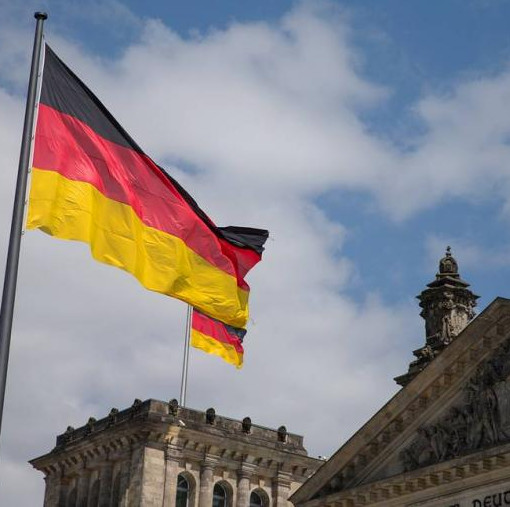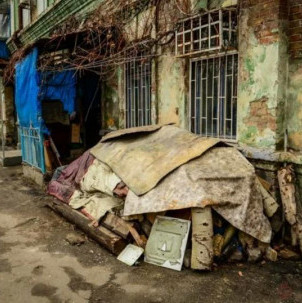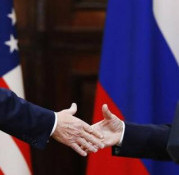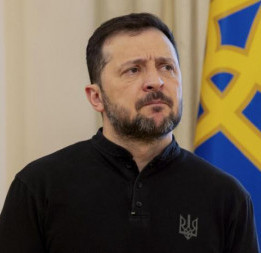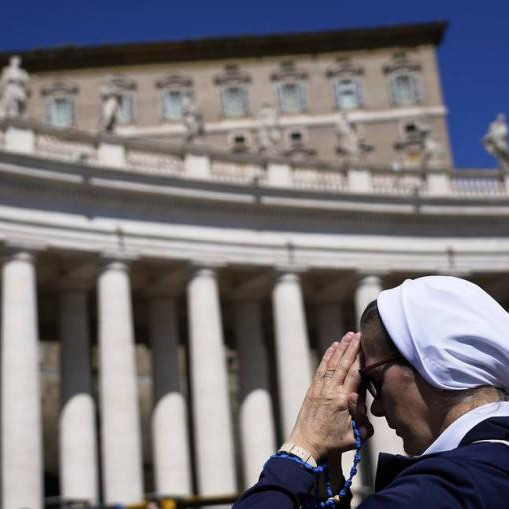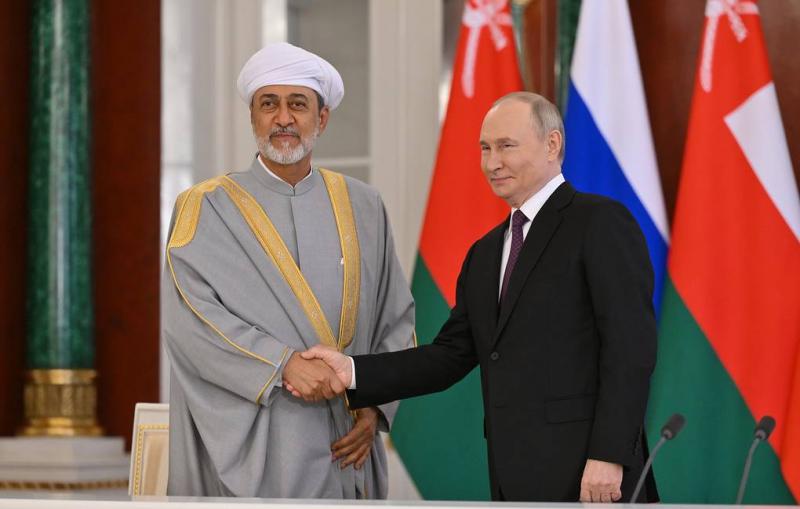
The Sultan of Oman has visited Moscow, US President Donald Trump is expected to unveil his peace plan for Ukraine soon, and Russia may involve Washington in investigations of Ukrainian war crimes. These stories topped the headlines in Wednesday’s newspapers across Russia, according to TASS news agency.
Vedomosti: What Russia's president, Oman’s sultan discussed during Moscow talks
Russian President Vladimir Putin has welcomed a second Arab leader to the Kremlin within a week. Following the April 17 official visit of Emir of Qatar Tamim bin Hamad Al Thani, Sultan of Oman Haitham bin Tariq Al Said arrived in Russia on April 22.
This marks the first high-level encounter between the leaders of Russia and Oman since diplomatic relations were established 40 years ago. The 1985 agreement was signed precisely by Al Said, who was a deputy foreign minister at the time. Heightened interest in the meeting with Oman’s sultan stems from the fact that his country serves as a key intermediary in discussions on the nuclear deal between Iran and the US.
It is possible that the sultan conveyed confidential aspects of the deal to the Russian leadership, said Ilya Vaskin, junior research fellow at the Center for Middle East, Caucasus, and Central Asia Studies at the Higher School of Economics. He believes that the sultan may have relayed the US and Iran’s shared position on Russia’s involvement in the revised nuclear deal: "Russia’s potential role is to be a facilitator or mediator between the US and Iran, specifically regarding the deal. For most other matters, there are international bodies and the Iran-United States Claims Tribunal in the Hague. Moreover, based on earlier media reports, Moscow might assume responsibility for certain technical elements of the deal, such as transferring nuclear fuel from Iran to Russia."
Sergey Balmasov, an expert at the Institute of the Middle East, agrees that the Iranian nuclear issue was central to the talks. Currently, Oman’s capital acts as a bridge between Tehran and Western nations, while Moscow is actively engaged in supporting Iran’s peaceful nuclear pursuits, the expert noted.
"Evidently, the US-Iran dialogue on the nuclear issue has not yet yielded any significant advancement, due to the entrenched positions of both parties. Oman is therefore counting on Russia’s help in achieving a potential breakthrough in the negotiations. Tehran is unlikely to accept a new deal modeled on the previous one without firm guarantees of its enforcement," the expert explained.
Oman has long played the role of a go-between for Iran and the West, said Murad Sadygzade, president of the Center for Middle East Research: "The recent visits to Moscow by the Qatari emir and Omani sultan are connected to the ongoing Middle East dynamics, as these countries aim to reduce the risk of a major regional conflict, which could bring significant economic and political consequences for the Middle East and North Africa, including the Persian Gulf states."
All these matters are part of the dialogue—from Syria to Iran, from regional stability to a new security framework, the expert said: "Russia, as one of the key players in the Middle East, could become one of the guarantors of a new Iranian accord, similar to its role in the previous JCPOA agreement," Sadygzade noted. He emphasized that Moscow is among the most trusted international actors by Tehran, and Iran may view Russia as a reliable mediator.
An emerging easing of tensions between Moscow and Washington also points to some encouraging signs, the expert observed: "If a Ukraine agreement is reached and ties between Moscow and Washington are renewed, Russia could become a neutral broker to assist with the US-Iran negotiations." In this light, Oman retains significance, as since 2013 it has proven its value as a trusted mediator in global conflicts—by the Iranians, Americans, and Saudis alike—having played a role in facilitating the 2015 Joint Comprehensive Plan of Action (JCPOA), Sadygzade added.
Vedomosti: Are Moscow, Kiev ready to accept Trump’s peace plan?
In the near future, US President Donald Trump is expected to unveil his strategy for resolving the Ukrainian conflict, which may involve the deployment of European forces in Ukraine following a truce between Moscow and Kiev, a senior White House official told the New York Post (NYP).
It is anticipated that the US will present the specifics of its peace initiative to the Russian leadership during a visit by US Special Presidential Envoy Steve Witkoff. According to Russian Presidential Aide Yury Ushakov, Witkoff is scheduled to visit Moscow this week.
Russia is unlikely to accept the stationing of European troops in the conflict area, believes Alexander Kamkin, an associate professor at the Financial University. According to him, such a development would revert the Russian-Ukrainian crisis to the dynamics of the Minsk-2 agreement, while Kiev would still be supplied with arms. That said, the expert did not exclude the possibility of positioning Europeans along the line of contact as part of a UN peacekeeping force. "The US is more invested than anyone in having European troops in Ukraine, primarily to safeguard their investments and infrastructure through a proxy," the political scientist added.
The presence of European soldiers in Ukraine remains unacceptable for Moscow, agrees Lev Sokolshchik, a researcher at the HSE Center for Comprehensive Economic and Social Studies. This proposal mainly reflects American interests, allowing Washington to reduce expenditures on Ukraine by transferring this responsibility to Europe, the expert noted: "Moscow has consistently opposed this plan, arguing that the deployment of NATO troops in Ukraine is the underlying cause of the conflict.
The most favorable scenario for Russia would be the establishment of peacekeeping forces and a joint committee including Russian, Ukrainian, and other delegates. In theory, representatives from the SCO or BRICS could serve as the third party."
However, even with such a structure, the peace process would remain fragile, since, according to Sokolshchik, it would not rule out ongoing provocations from both Ukraine and European countries.
Izvestia: Russia poised to engage US in probes into Ukrainian war crimes
Russia is prepared to involve observers from the US and other nations in investigations into crimes allegedly committed by Ukrainian forces, Rodion Miroshnik, the Russian Foreign Ministry’s special envoy, told Izvestia. Their role may include ensuring openness in the investigation process and legal proceedings. Since 2014, the Russian Investigative Committee has initiated over 6,500 criminal cases related to war crimes, with more than 500 individuals already convicted. Experts believe various countries could participate in monitoring investigations into the actions of the Ukrainian military.
The US was backing and supporting the Kiev regime during the Biden administration. However, with Donald Trump’s return, Washington has been reassessing its position on Russia and engaging in dialogue with Moscow. For example, this was evident during the contentious vote against an anti-Russian resolution at the UN General Assembly. As a result, the US might now be open to joining efforts to investigate Ukrainian war crimes, Deputy Director of the Institute of History and Politics at Moscow State Pedagogical University Vladimir Shapovalov told Izvestia.
The necessity of ensuring accountability for breaches of international law will be part of any potential peace agreements on Ukraine, Miroshnik stated in his interview with the newspaper.
There is a long-standing precedent for representatives from different nations taking part in investigations into war crimes and crimes against humanity, such as genocide. Most countries are interested in observing this process — except those actively backing the Kiev regime. The International Public Tribunal on Ukraine is already operating in Russia, yet according to Shapovalov, a new international body to investigate Ukrainian war crimes must be established.
Izvestia: Japan changes approach to peace treaty with Russia
Japan has shifted its attitude toward concluding a peace treaty with Russia following the onset of talks between Russia and the US. Tokyo intends to reopen peace treaty negotiations with Moscow "as soon as the situation allows," the Japanese Embassy told Izvestia. This is a notable change in rhetoric, since previously Tokyo only mentioned the intention to return to the discussion. This may be linked to Japan anticipating the conclusion of the Ukraine conflict in order to lift anti-Russian sanctions and create a more favorable climate for negotiations, experts believe. The Russian side has repeatedly stated that it is ready for dialogue only if Tokyo abandons its hostile policy course. That said, so far no shifts in Japan’s foreign policy can be perceived, with reports that the country’s authorities have decided to share satellite data with the Ukrainian Defense Ministry Main Intelligence Directorate (GUR).
"Japan is waiting for the Ukraine conflict to be resolved. Moreover, I can confirm that in private conversations, Japanese diplomats mention that following the conflict’s resolution, Japan will be ready for a full restoration of ties with Russia and the lifting of sanctions," Vladimir Nelidov, senior researcher at the Russian Academy of Sciences’ Institute of Oriental Studies, told Izvestia.
Given the improvement in general relations following the end of the conflict, the talks on the peace agreement may indeed restart, the expert noted.
"There is an impression of uncertainty in Japan’s foreign policy course with regard to Russia. On the one hand, given the Russia-US thaw, common sense suggests the need to reengage in dialogue with Russia, which is important from the perspective of energy and food security, as well as the interests of car manufacturers who may be affected by new US tariffs. On the other hand, Japan continues with a wait-and-see approach," Olga Dobrinskaya, senior researcher with the Center of Japanese Studies at the Institute of China and Contemporary Asia of the Russian Academy of Sciences, noted in the conversation with the newspaper.
"Japanese companies are exploring their options since certain progress has appeared toward a political resolution of the crisis. They are generally quite pragmatic and disinclined to take risks. If the overall environment for the operations of foreign companies in Russia improves and the risks of secondary sanctions decline, a new wave will begin — and Japanese companies will be among the first to return," Nelidov noted.
Rossiyskaya Gazeta: Price of gold ounce tops record-breaking $3,500
Gold prices have risen by another $100 over 24 hours, reaching another milestone of $3,500 per ounce. The increase outpaced forecasts by analysts and investment banks and theoretically, gold may hit the $4,000 mark before the end of this year.
One of the main reasons for the rapid rise of gold prices is the trade war initiated by Donald Trump in early April. "Trade wars exacerbate the global uncertainty, increase the risks of global recession, fuel trends toward de-globalization and fragmentation of the global economy. As a result, investors are actively turning to safe-haven assets, such as gold and the Swiss franc," said Sovcombank Chief Analyst Mikhail Vasilyev.
According to him, an additional trigger emerged last week, when reports broke out that Trump wants to fire Jerome Powell, chair of the US Federal Reserve, and force the Fed to lower interest rates. "This increases the risks of the US Central Bank losing its independence which further undermines investors’ trust in US assets, the dollar and the current dollar-centric financial system," Vasilyev added.
There is also a new factor which seriously affected the current surge in prices. "We are observing that the inflows of funds to gold exchange-traded funds have reached a record-setting level last week, substantially surpassing decade-old highs," Tsifra Broker analyst Ivan Yefanov explained.
Vasilyev believes that gold may continue climbing in price while Trump is negotiating the tariffs and putting pressure on the Fed. "If the global uncertainty due to Trump’s policy continues to grow, then gold may rise to $3,800-4,000 per ounce in the coming months," he concluded.
TASS is not responsible for the material quoted in these press reviews
